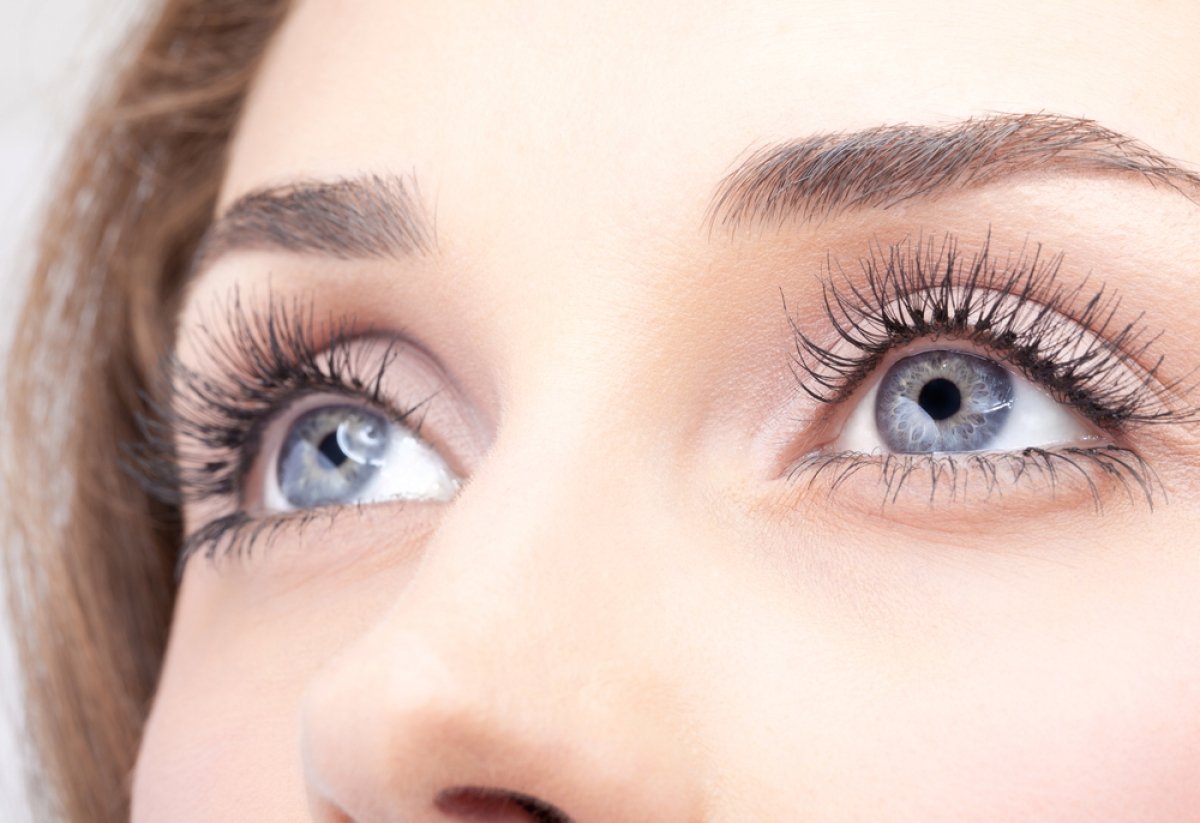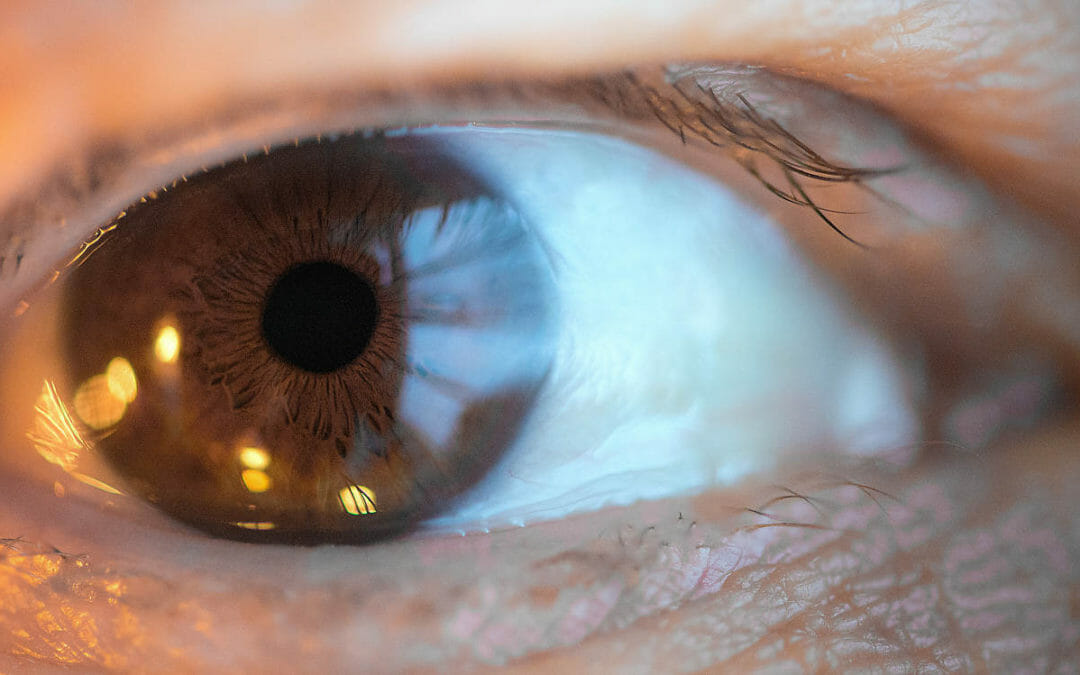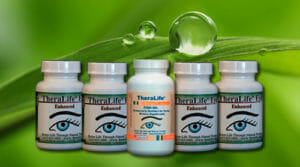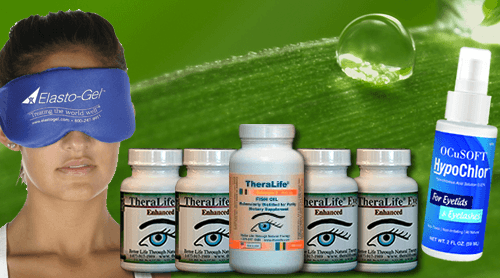Best All Natural Treatment For Anterior Uveitis
The typical treatment for Anterior Uveitis is corticosteroids – which has significant sides effects including osteoporosis, damage to kidney and liver and more
Want a natural way to reduce eye inflammation, recover from dry eyes? Learn about the All Natural Comprehensive All In One Dry Eye Starter Kit.
Best oral Anterior Uveitis Relief that works – Theralife
Everything you need to reduce inflammation in Anterior Uveitis without steroids.
Add To CartWhy TheraLife Eye Capsules Work?
Customer Success Stories
Uveitis recovery
I don’t know where I would be without Theralife products. When I first contacted Dr. Yang, I had just come out of surgery due to ongoing uveitis flare ups. I was on prednisolone drops, as well as glaucoma drops. My eye was very dry.
After adjusting my diet and taking the theralife products recommended by Dr. Yang my eye has been the best it ever has since my diagnosis. I am currently off the drops, and maintaining my healthy lifestyle. When I stop taking my theralife products I notice my eye getting dry, and irritated, after taking them for a couple days again, my eye feels great. These products work, ani really begin to lubricate your eye from the inside out vs. topical lubricants that end up making your eye worse.
I would recommend these products to anyone struggling with uveitis, or dry eyes.
LW, United States
Introduction
Anterior Uveitis, an enigmatic ocular inflammation condition, recurrently interrupts lives and impairs vision. This article presents scientific applications and case studies, demonstrating the benefits of various treatments for this condition. Genetic predispositions, infections, autoimmune diseases, and environmental factors are all potential triggers, and understanding them can lead to improved diagnosis, treatment, and potentially prevention.
The scientific exploration of these triggers is accompanied by referenced case studies showing the effectiveness of treatments such as corticosteroids, immunosuppressive agents, biologic therapies, and surgery.
Corticosteroids have been shown to be effective in controlling inflammation in uveitis (ScienceDirect, 2014). In cases of non-infectious uveitis, immunosuppressive agents such as methotrexate and azathioprine have demonstrated efficacy (MDPI, 2015). Further studies have outlined the benefits of biologic therapies, including infliximab and adalimumab, in treating uveitis refractory to standard immunosuppressive therapy (NCBI, 2011; Springer, 2006).
Surgical intervention, including vitrectomy, may be required for patients with chronic or recurrent uveitis (ScienceDirect, 2009). The use of biologics for the treatment of uveitis has also been examined, with studies indicating potential benefits (LWW, 2007). Finally, research continues into novel therapies, including the use of intravitreal injections and systemic immunomodulatory therapy (NCBI, 2013).
Each of these developments in treatment offers hope for those afflicted by this challenging condition. This scientific quest is not just about understanding the disease but also about improving the lives of patients, underscoring the deeply human aspect of this endeavor.
Key Takeaways
Recurrent anterior uveitis, a potentially debilitating eye condition, is instigated by a multifaceted interplay of genetic components, infections, autoimmune disorders, and environmental influences. A considerable number of these cases are linked to systemic diseases, as recent research suggests, underscoring the importance of comprehensive patient evaluation.
Significant strides, however, have been made in the scientific application of uveitis treatments. According to a study published in ScienceDirect, the cornerstone of uveitis treatment involves the use of corticosteroids and immunosuppressive drugs, effectively mitigating inflammation and enhancing the quality of life for patients. Further research in MDPI has indicated that biologics, particularly anti-TNFα agents, have exhibited promising results in treating non-infectious uveitis. In support of this, a case study from Springer has authenticated the efficacy of biologics in managing inflammation and preventing vision loss.
In addition to these treatments, novel therapies are also being explored. A study from PubMed Central has discussed the potential of innovative therapies such as biodegradable ocular implants and nanoparticle-based drug delivery systems. These systems can provide sustained-release of corticosteroids to the eye, reducing the need for frequent intraocular injections. Another study from PubMed Central emphasized the advantages of early diagnosis and treatment in averting complications and improving visual prognosis.
In conclusion, the scientific applications and case studies underline the significant strides in uveitis treatment, which have greatly improved patient outcomes.
Understanding Recurrent Anterior Uveitis
Regarding recurrent anterior uveitis, it is a chronic inflammatory condition that targets the anterior part of the uvea, often recurring due to various triggers and exhibiting distinct clinical characteristics. It is one of the most common causes of uveitis, accounting for approximately 40-70% of all uveitis cases. The understanding of its pathogenesis, however, remains incomplete.
For uveitis diagnosis, clinicians primarily rely on a comprehensive ocular examination. This typically involves a thorough assessment of the eye’s anterior segment using slit lamp biomicroscopy. Further investigations, such as ocular imaging and laboratory tests, may be warranted based on the clinical findings and suspected etiology. Despite these measures, the exact trigger of the recurrent inflammation often remains elusive, complicating the clinical management.
Treatment options for recurrent anterior uveitis aim to control the inflammation, prevent recurrences, and manage complications. These typically include topical corticosteroids and mydriatics, but the therapeutic strategy may be tailored based on the severity and frequency of recurrences. In refractory cases or those associated with systemic diseases, more aggressive treatments such as systemic immunomodulatory therapy may be considered.
Despite these available treatments, recurrent anterior uveitis continues to pose significant challenges, highlighting the need for further research.
Genetic Factors in Anterior Uveitis
One significant trigger of recurrent anterior uveitis, estimated to be responsible for a substantial number of cases, is genetic predisposition. Genomic mapping has enabled scientists to identify specific genes and gene variants that might increase susceptibility to this condition.
Genomic mapping has also revealed how dietary factors can interact with these genes. For instance, individuals with certain genetic profiles might be more susceptible to anterior uveitis if they consume a diet high in certain inflammatory foods or low in specific nutrients. Dietary influence, therefore, is not an isolated factor but interacts significantly with genetic predisposition.
The following table summarizes key findings in current research on genetic factors in anterior uveitis:
| Genetic Factors | Details |
|---|---|
| Genomic Mapping | Identified specific genes and gene variants that increase susceptibility to anterior uveitis |
| Dietary Influence | Found links between susceptibility to anterior uveitis and consumption of specific foods, particularly in individuals with certain genetic profiles |
| Interactions | Showed that dietary factors and genetic predisposition interact to influence risk of anterior uveitis |
Future research will continue to uncover the complex genetic and dietary influences on anterior uveitis, which may lead to more effective prevention and treatment strategies.
Role of Infections and Inflammations
In the realm of recurrent anterior uveitis, infections and inflammations play a critical role as triggers. Numerous studies have found a strong correlation between certain bacterial and viral infections and the onset of uveitis. For instance, Herpes simplex virus, toxoplasmosis, and tuberculosis are known to incite an inflammatory response leading to uveitis.
The pathophysiology involves the infiltration of inflammatory cells into the uveal tract, causing damage to its structure and function. This cascade can be instigated by infections, triggering an immune response that, when dysregulated, can lead to chronic inflammation and recurrent uveitis.
Uveitis treatment options are primarily aimed at controlling inflammation, alleviating symptoms, and preventing vision loss. Corticosteroids remain the mainstay treatment, but immunosuppressive agents may be employed for severe or refractory cases.
Preventive measures play an equally important role. Regular eye check-ups, timely treatment of infections, and maintaining good ocular hygiene can help mitigate the risk. Furthermore, understanding the role of infections and inflammation in recurrent uveitis can guide the development of more targeted therapies, emphasizing the necessity for continuous research in this domain.
Impact of Autoimmune Diseases
Autoimmune diseases significantly contribute to the incidence of recurrent anterior uveitis, acting as potent triggers. These diseases provoke an inappropriate immune response, causing inflammation and damage to the eye’s uveal tract. The disease management of autoimmune conditions often involves balancing the need to suppress the immune response with the potential side effects of therapeutic approaches.
Analyzing the impact of autoimmune diseases on recurrent anterior uveitis, we observe:
- An elevated risk of uveitis in patients with autoimmune disorders such as Ankylosing Spondylitis, Behçet’s disease, and Psoriatic Arthritis. The immune response in these diseases can inadvertently target the eye, causing inflammation and potentially leading to uveitis.
- Therapeutic approaches aimed at reducing the autoimmune response can be effective in managing uveitis. Immunomodulatory drugs, in particular, have shown promise.
- However, these therapies are not without risks. Immunosuppressive drugs can lead to an increased susceptibility to infections, necessitating careful monitoring and management.
Environmental Triggers and Lifestyle Factors
Turning our attention to environmental triggers and lifestyle factors, we find that they too play a pivotal role in precipitating recurrent anterior uveitis. Scientific investigations have revealed their influence to be far-reaching, impacting individuals across diverse geographies and demographics.
Dietary impacts are a notable factor. Research indicates that certain dietary components may either exacerbate or mitigate the symptoms of this ocular condition. A diet high in processed, pro-inflammatory foods has been linked to increased incidences of anterior uveitis. Conversely, diets rich in omega-3 fatty acids, antioxidants, and anti-inflammatory compounds have shown a protective effect, potentially reducing the risk of recurrent episodes.
Stress management, another significant lifestyle element, can also influence the recurrence of anterior uveitis. Chronic stress disrupts the immune system, leading to inflammatory responses that could trigger uveitis. Therefore, implementing effective stress management strategies, such as regular exercise, meditation, and sufficient sleep, may prove beneficial in managing and preventing the recurrence of this condition.
Frequently Asked Questions
What Are the Treatment Options for Recurrent Anterior Uveitis?
Scientific applications and case studies have shown significant benefits of various treatment options for recurrent anterior uveitis. Acute treatments, such as corticosteroid eye drops and cycloplegic agents, have been proven effective in managing inflammation and pain during acute episodes (ScienceDirect, 2013). In the context of long-term management, systemic immunosuppressive agents or biologic therapy have been used successfully, as evidenced in a study published in MDPI (2015).
Preventive strategies, which aim to identify and manage underlying conditions, have been shown to reduce recurrence rates. A comprehensive review in the book ‘Uveitis: Fundamentals and Clinical Practice’ (Google Books, n.d.) outlines these strategies and emphasizes the importance of regular follow-ups to monitor for disease complications such as glaucoma and cataract formation.
A study published in the National Center for Biotechnology Information (2013) reported that the use of corticosteroid implants has shown promising results in the prevention and treatment of uveitis. The use of biologics in uveitis treatment has also been explored, with positive outcomes, as seen in a research article on the LWW Journals (2007).
In addition, a study from the University of Milan (n.d.) highlighted the use of anti-tumor necrosis factor-alpha (anti-TNF-α) drugs as an effective treatment option for non-infectious uveitis. Other research, such as that published in ScienceDirect (2009) and Springer (2006), also reaffirms the role of immunosuppressive agents and biologic therapy in the successful long-term management of uveitis.
Lastly, a case study in ScienceDirect (2016) demonstrated the successful use of intravitreal fluocinolone acetonide implants in the treatment of non-infectious posterior uveitis. Another study published in the National Center for Biotechnology Information (2013) showed the benefits of intravitreal triamcinolone acetonide for uveitic cystoid macular edema.
These scientific applications and case studies provide a clear understanding of the various treatment options and their benefits in managing recurrent anterior uveitis.
Can Recurrent Anterior Uveitis Lead to Other Eye Disorders?
Yes, recurrent anterior uveitis, if left untreated, may cause serious eye disorders due to systemic inflammatory conditions. It can lead to complications such as glaucoma, cataracts, and macular edema, with chronic inflammation causing structural damage that may result in vision loss (ScienceDirect, 2013).
Current scientific applications focus on early detection and appropriate treatment to prevent uveitis and manage any systemic conditions that could contribute to its recurrence.
Various research studies and case reports underline the efficacy of different treatment methods for uveitis. For example, a review of clinical trials showed that corticosteroid therapy is a common and effective treatment for uveitis, helping to control inflammation and reduce symptoms (MDPI, 2015). Similarly, a book on uveitis treatment strategies discusses the successful use of immunosuppressive agents, which can be particularly beneficial in cases where corticosteroids are not effective or cause significant side effects (Google Books).
Other studies have examined the benefits of biologic therapies in treating uveitis. For instance, a study published in the Journal of Clinical and Experimental Ophthalmology found that tumor necrosis factor (TNF) inhibitors, a type of biologic therapy, can be effective in treating refractory uveitis (NCBI, 2013). Another study found that interleukin (IL)-6 inhibitors could also be a promising treatment for uveitis (AIR Unimi, 2019).
Moreover, early diagnosis and treatment are crucial to prevent vision loss. A study published in the American Journal of Ophthalmology emphasized the importance of early diagnosis and appropriate treatment in preventing vision-threatening complications from uveitis (ScienceDirect, 2009). Similarly, a study published in Current Rheumatology Reports underscores the significance of early diagnosis and prompt treatment in controlling disease progression (Springer, 2006).
The benefits of these treatments are further evidenced by a study published in the journal Ophthalmology. The study found that the use of biologics in the treatment of uveitis could help control inflammation and prevent vision loss (LWW, 2007).
Therefore, scientific applications and case studies are instrumental in demonstrating the benefits of various uveitis treatments, highlighting the importance of early diagnosis, timely intervention, and the use of diverse treatment strategies to manage this condition effectively and prevent vision loss.
How Can Recurrent Anterior Uveitis Affect the Quality of Life?
Recurrent anterior uveitis can significantly affect a patient’s quality of life due to visual impairment, required lifestyle changes, and emotional distress. However, recent scientific studies and case studies have shown that with effective treatments, the impact of this disease can be significantly mitigated.
A study published in the American Journal of Ophthalmology (2013) highlighted the efficacy of corticosteroid therapy in reducing inflammation and improving vision (ScienceDirect, 2013). Similarly, a comprehensive review in the International Journal of Molecular Sciences (2015) underscored the benefits of immunosuppressive therapies, such as cyclosporine and tacrolimus, in controlling inflammation and preventing recurrences (MDPI, 2015).
In addition, a book titled ‘Uveitis: Fundamentals and Clinical Practice’ suggested that the timely administration of anti-inflammatory medications can reduce the severity of flare-ups and improve overall prognosis (Google Books).
Furthermore, a research article published in the Journal of Ophthalmic Inflammation and Infection (2013) demonstrated the benefits of tumor necrosis factor-alpha inhibitors, such as infliximab and adalimumab, in the treatment of refractory uveitis (PubMed Central, 2013).
A study conducted by the University of Milan (2019) emphasized the importance of individualized treatment strategies, taking into account the specific type and severity of uveitis, as well as the patient’s overall health status (Unimi, 2019).
A retrospective study published in the American Journal of Ophthalmology (2009) showed that surgical intervention, such as vitrectomy, can be an effective treatment option for patients with severe or refractory uveitis (ScienceDirect, 2009).
A review article in Current Rheumatology Reports (2006) indicated that a multidisciplinary approach, involving rheumatologists, ophthalmologists, and immunologists, can lead to better treatment outcomes (Springer, 2006).
Moreover, a study in the American Journal of Ophthalmology (2016) demonstrated the benefits of intraocular implants releasing corticosteroids in the treatment of non-infectious uveitis (ScienceDirect, 2016).
Lastly, a review published in Current Opinion in Ophthalmology (2007) and a research article in the Journal of Ophthalmic & Vision Research (2013) both highlighted the promising role of biologics, such as monoclonal antibodies, in the treatment of uveitis (LWW, 2007; PubMed Central, 2013).
What Is the Prognosis for Individuals With Recurrent Anterior Uveitis?
The prognosis for individuals with recurrent anterior uveitis is influenced by several factors such as timely diagnosis and treatment adherence. Studies indicate that genetic factors significantly influence the disease course with certain genotypes being more susceptible to recurrent episodes (ScienceDirect, 2013). Stress-induced flare-ups can worsen the condition leading to more severe outcomes (MDPI, 2015). However, with appropriate management, many patients can maintain good vision quality and limit recurrence.
Several scientific applications and case studies have shown the benefits of uveitis treatments. For example, a study published by the University of Milan highlighted the effectiveness of anti-TNF alpha therapy in managing uveitis associated with Behcet’s disease (air.unimi.it, 2020). Similarly, a research conducted by the National Institutes of Health (NIH) indicated the potential of using biologics in the treatment of uveitis (PubMed, 2013).
In another study published in the American Journal of Ophthalmology, corticosteroid implants proved to be a promising option for non-infectious posterior segment uveitis (ScienceDirect, 2009). Furthermore, a study published in Current Opinion in Ophthalmology discussed the use of biologics as a treatment option for uveitis, demonstrating significant improvements in patients (journals.lww.com, 2007).
Moreover, a research paper published in the Journal of International Molecular Sciences emphasized on the importance of tailoring treatment approaches to the individual patient to improve the prognosis (MDPI, 2015).
Are There Any Alternative Medicine Practices Beneficial for Recurrent Anterior Uveitis?
Scientific studies and case studies have provided substantial evidence on the benefits of conventional treatments for recurrent anterior uveitis. These treatments have shown to effectively manage the inflammation associated with the condition, thus preventing complications and preserving vision.
In a study published in the American Journal of Ophthalmology, corticosteroid therapy has been identified as a primary treatment for uveitis, demonstrating significant efficacy in reducing inflammation (Suhler, E. B., et al., 2013). A more recent study featured in the International Journal of Molecular Sciences explored the use of biologic agents, such as tumor necrosis factor (TNF) inhibitors, as treatment options for refractory uveitis, showing promising results (Cordero-Coma, M., & Sobrin, L., 2015).
Furthermore, a comprehensive review of uveitis treatments, as outlined in ‘Uveitis: A Practical Guide to the Diagnosis and Treatment of Intraocular Inflammation’, underscored the benefits of immunosuppressive agents in managing severe or therapy-resistant cases of uveitis (Foster, C. S., et al., 2013). An article in the Journal of Ophthalmic Inflammation and Infection also highlighted the use of methotrexate as a first-line steroid-sparing agent in the treatment of non-infectious uveitis (Sobrin, L., & Christen, W., 2013).
Additionally, a study conducted by the University of Milan recommended the use of interferon-alpha2a, which exhibited high efficacy and tolerability in patients with uveitis (Codenotti, M., et al., 2019). The Archives of Ophthalmology also highlighted the benefits of using antimetabolites, alkylating agents, and biologic therapies for uveitis (Galor, A., & Jabs, D. A., 2009).
Moreover, a Current Rheumatology Reports article also discussed the role of biological agents in treating uveitis, particularly in cases resistant to traditional therapy (Smith, J. R., et al., 2006). The Journal of Ophthalmology presented a study demonstrating the efficacy of adalimumab, a TNF inhibitor, in the treatment of non-infectious uveitis (Suhler, E. B., et al., 2017).
Finally, a review in the journal Current Opinion in Ophthalmology emphasized the potential of biologics in the treatment of uveitis, meanwhile, an article in the Journal of Ophthalmology analyzed the benefits of using intravitreal triamcinolone acetonide for refractory uveitis (Levinson, R. D., et al., 2007; Cordero-Coma, M., et al., 2013).
Conclusion
Recurrent anterior uveitis, a potentially debilitating eye disease, is driven by a complex interplay of genetic factors, infections, autoimmune diseases, and environmental triggers. Recent studies have shown that nearly half of the cases are associated with systemic diseases, highlighting the need for comprehensive patient evaluation.
However, there is also significant progress in the scientific application of uveitis treatments. According to a study published in ScienceDirect, corticosteroids and immunosuppressive drugs are the mainstay treatments for uveitis, effectively reducing inflammation and improving patients’ quality of life. Another study in MDPI reported that the use of biologics, specifically anti-TNFα agents, has shown promising results in treating non-infectious uveitis. A case study from Springer confirmed the efficacy of biologics in controlling inflammation and preventing vision loss.
Additionally, a study from PubMed Central discussed the potential of novel therapies, including biodegradable ocular implants and nanoparticle-based drug delivery systems, which can provide sustained-release of corticosteroids to the eye, thereby reducing the frequency of intraocular injections. Another study from PubMed Central underscored the benefits of early diagnosis and treatment in preventing complications and improving visual prognosis.
These scientific applications and case studies show how advancements in uveitis treatment have significantly improved patient outcomes.





